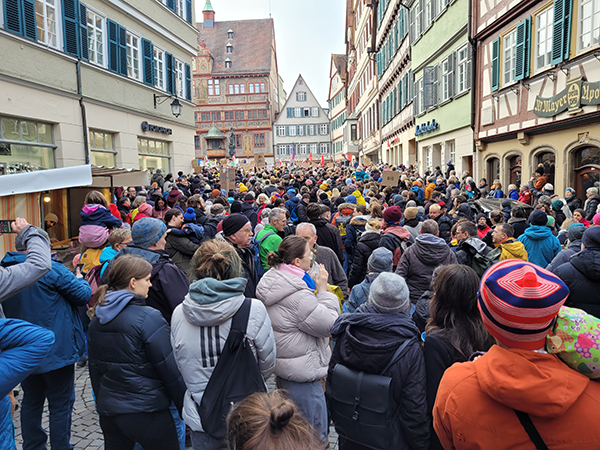By Ute Kaiser
In Germany, hundreds of thousands are demonstrating for democracy and against right-wing extremism. They are also protesting against the “remigration” ideas of the Alternative for Germany (AfD) party. This fighting term stands for “the deportation of all people with supposedly the wrong skin color or origin, even if they are German citizens”. This was said by a member of the jury that declared the term “remigration” to be the bad word of the year 2023 (see the news item tun24011603).
What is the right to demonstrate in Germany? Article 8, paragraph 1 of the Basic Law stipulates that all Germans have the right to assemble peacefully and without weapons without registration or permission. However, the basic right to assemble in the open air is restricted by the Assembly Act with regard to registration and permission (see below).
Does this fundamental right only apply to Germans? No. The Federal Assembly Act, which also applies in Baden-Württemberg, states: “Everyone has the right to organize public assemblies and processions and to participate in such events.” This is because both the Universal Declaration of Human Rights and the European Commission on Human Rights consider freedom of assembly to be a human right.
Who has no right to demonstrate? According to the Assembly Act, these are, for example, those who wish to promote the aims of a party declared unconstitutional by the Federal Constitutional Court, as well as parties declared unconstitutional or banned associations that are directed against the constitutional order or against the idea of international understanding.
What is prohibited at demonstrations? According to the Assembly Act, no one may carry weapons or objects with which people can be injured or property damaged. It is also forbidden to wear uniforms or clothing intended to express a common political opinion at the demonstration. This applies to Nazi symbols, for example.
What other rules apply? According to the Assembly Act, a demonstration must be registered with the competent authority—the Office for Public Order—at least 48 hours in advance.
A demonstration can be banned or certain conditions can be imposed. This applies, for example, if it is to take place at a location that “as a memorial of historically outstanding, supra-regional significance commemorates the victims of inhumane treatment under the National Socialist regime of violence and arbitrariness” and it is to be feared that “the dignity of the victims will be impaired”. The Assembly Act explicitly mentions the Memorial to the Murdered Jews of Europe in Berlin.
In addition, nothing may be worn that prevents people from being identified, such as masks or hoods that only reveal the eyes.
Can demonstrations be banned? Yes, demonstrations can be banned before they start or broken up after they have started, but only if they pose an immediate threat to public safety—for example through violence. However, according to the Federal Ministry of the Interior, a ban or dissolution should only be “the last resort”. Restrictions can be ordered beforehand.
Are counter-demonstrators allowed to disrupt? Anyone who wants to prevent authorized demonstrations and threatens to use violence, becomes violent or causes massive disruption is punished with a prison sentence of up to three years or a fine.
Section IV of the Assembly Act also contains all other penalties and fines for non-compliance with the rules.
See:
https://www.gesetze-im-internet.de/versammlg/BJNR006840953.html
and
https://www.bmi.bund.de/DE/themen/verfassung/staatliche-ordnung/versammlungsrecht/versammlungsrecht-node.html
tun24012401
Demonstration auf dem Tübinger Marktplatz. Foto: tuenews INTERNATIONAL / Oula Mahfouz
002282




